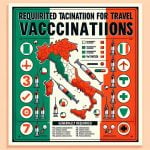With its breathtaking landscapes, iconic landmarks, and rich cultural heritage, Italy has long captivated the hearts of travelers from around the world. From the majestic Colosseum in Rome to the romantic canals of Venice, this Mediterranean gem offers an unparalleled experience that combines history, art, cuisine, and vibrant culture. Whether you’re a food lover eager to savor authentic pasta and pizza or an art enthusiast ready to explore world-renowned museums and galleries, Italy has something for everyone.
As you embark on your journey to Italy, prepare to be enchanted by its countless attractions and hidden gems. Discover the wonders of Renaissance art in Florence, wander through the ancient ruins of Pompeii near Naples, or indulge in a leisurely gondola ride through the enchanting waterways of Venice.
Immerse yourself in the vibrant atmosphere of bustling piazzas, where locals gather for espresso and lively conversations. Taste the flavors of Italy as you savor gelato from a quaint gelateria or enjoy a traditional Italian meal at a local trattoria.
In addition to its undeniable beauty, Italy boasts a diverse range of experiences for every traveler. Explore the picturesque countryside dotted with vineyards and hilltop villages in Tuscany or bask in the sun on the stunning beaches along the Amalfi Coast. Ski enthusiasts can hit the slopes in renowned resorts like Cortina d’Ampezzo or Val Gardena. From fashion-forward Milan to charming coastal towns like Cinque Terre, each region showcases its unique character and allure.
Before embarking on your Italian adventure, it is important to familiarize yourself with the requirements for travel to Italy. From visa regulations and passport validity to travel insurance and health precautions, adequate preparation ensures a smooth and hassle-free trip. In this article series, we will guide you through all essential aspects of planning your journey to Italy so that you can make the most of this unforgettable destination.
Get ready to immerse yourself in la dolce vita and experience all that Italy has to offer. “.
Visa and Travel Documents
Visa Requirements for Different Travelers
When planning a trip to Italy, it is essential to familiarize yourself with the visa requirements based on the purpose of your travel. For tourists visiting Italy for leisure or vacation, a Schengen visa is required. This visa allows you to travel within the Schengen Area for up to 90 days within a 180-day period. Business travelers may require a different type of visa depending on the nature and duration of their visit.
To obtain a Schengen visa, you will need to provide several documents, including a valid passport, proof of accommodation or hotel reservation, travel itinerary, round-trip flight tickets, and travel insurance with coverage of at least €30,000 ($36,000) for medical expenses. It’s important to note that the specific requirements can vary depending on your country of residence.
For those planning to study in Italy or engage in long-term stays for work purposes, different visa categories apply. Students must obtain a student visa (type D), while individuals seeking employment must have an appropriate work permit prior to entering Italy.
The Schengen Area and Entry Restrictions
Italy is part of the Schengen Area, which comprises 26 European countries that have abolished border controls between each other. This means that once you enter one Schengen country, such as Italy, you can generally move freely within all member states without undergoing additional passport checks. However, it’s important to note that due to COVID-19 or other reasons, temporary entry restrictions may be imposed.
Before traveling to Italy, it is crucial to check the latest entry restrictions and requirements as they may vary depending on your country of origin or transit stops along your journey. Some countries may require pre-arrival registration or quarantine periods upon arrival in Italy. The European Union’s Re-Open EU website provides up-to-date information on entry regulations for each member state, including Italy.
Applying for Visas and Obtaining Travel Permits
To apply for a visa to travel to Italy, you should contact the Italian Embassy or Consulate in your country of residence. They will provide you with the necessary information, application forms, and guidelines. It is advisable to start the visa application process well in advance, as it may take several weeks for processing.
In addition to visas, certain travelers may require special travel permits or clearances. For example, if you plan to engage in work activities during your visit or if you are traveling with certain types of medication or animals, specific permits may be necessary.
The Italian Ministry of Foreign Affairs website provides comprehensive information on various types of visas and travel permits required for different purposes of travel. Be sure to review their resources carefully and complete all necessary procedures before your departure date.
Passport and Entry Requirements
When planning your trip to Italy, one of the most important things to consider is ensuring that you have a valid passport. Your passport serves as your key to entry into the country, so it’s essential to understand the requirements and ensure that your passport meets them.
To enter Italy, your passport must be valid for at least six months beyond your intended departure date. This means that if you plan to leave Italy on September 1st, your passport should not expire before March 1st of the following year. It’s crucial to check the expiration date on your passport and renew it if necessary well in advance of your trip.
In addition to passport validity, there may also be specific entry restrictions based on health or other special circumstances. For example, certain countries have additional requirements for travelers from areas with high disease transmission rates. It’s essential to stay informed about any travel advisories or restrictions that may apply to your specific situation, which can typically be found on government travel websites or by consulting with your local embassy or consulate.
Key points
- A valid passport is required for entry into Italy.
- The passport should have at least six months validity remaining.
- Check for any entry restrictions based on health or other special circumstances.
Remember, having a valid passport and meeting all entry requirements is just the first step in ensuring a smooth entry into Italy. It’s always good practice to carry a copy of your passport and any relevant travel documents with you while exploring the country. By being prepared and informed about these passport and entry requirements, you can focus on enjoying all that Italy has to offer without any unnecessary delays or complications.
Italy Travel Insurance
Travel insurance is an essential aspect of planning for any international trip, including travel to Italy. Having travel insurance provides peace of mind and financial protection in case of unexpected events or emergencies during your trip. When traveling to Italy, it is important to consider the specific coverage you may need.
Medical coverage is a crucial component of travel insurance in Italy. While Italy has a high standard of healthcare, medical expenses can be costly for foreigners without appropriate insurance coverage. It is advisable to choose a travel insurance policy that includes comprehensive medical coverage, including emergency medical expenses, hospitalization, and repatriation. In addition to medical coverage, consider selecting a policy that covers emergency dental care as well.
Another important aspect of travel insurance when visiting Italy is trip cancellation and interruption coverage. This feature safeguards your investment in case you need to cancel or cut short your trip due to unforeseen circumstances such as illness or a family emergency. It can reimburse you for non-refundable expenses such as flights, accommodations, and pre-paid tours or activities.
Lost baggage protection is also worth considering when purchasing travel insurance for your trip to Italy. It provides coverage in case your luggage gets lost, damaged, or stolen during your journey. This coverage typically offers reimbursement for necessary items like clothing and toiletries while you wait for your luggage to be returned or replaced.
To ensure that you have reliable travel insurance coverage during your stay in Italy, it’s recommended to purchase it from reputable providers specializing in international travel insurance. Some well-known companies include Allianz Global Assistance, World Nomads, and AXA Assistance. These companies offer various plans with different levels of coverage depending on your needs and preferences.
COVID-19 Safety Measures and Requirements in Italy
As the world continues to grapple with the ongoing COVID-19 pandemic, it is crucial for travelers to stay informed about the safety measures and requirements in their chosen destination. Italy, known for its rich culture and historical landmarks, has implemented a series of measures to ensure the safety of both tourists and residents. Here are some important guidelines to keep in mind when planning your trip to Italy:
- Entry Requirements: Before traveling to Italy, it is essential to check the entry requirements in place due to the pandemic. Currently, all travelers entering Italy must provide proof of a negative COVID-19 test result (either PCR or antigen) taken no more than 48 hours before arrival. In addition, visitors may need to fill out a self-declaration form stating their purpose of travel and agreeing to abide by quarantine rules if necessary.
- Quarantine Rules: Travelers coming from certain countries may be required to undergo quarantine upon arrival in Italy. The length of quarantine varies based on factors such as vaccination status and country of origin. It is important to check with the Italian embassy or consulate in your home country for the most up-to-date information regarding quarantine requirements.
- Vaccination Certificate: Italy recognizes COVID-19 vaccination certificates from various countries, including those issued by EU Member States and recognized third-party countries. Fully vaccinated individuals may be exempt from certain testing or quarantine requirements. Make sure to carry your vaccination certificate or proof of recovery from COVID-19 along with any necessary translation documents.
For detailed information on current COVID-19 entry requirements and safety measures in Italy, it is advisable to visit reliable sources such as the official website of the Italian Ministry of Health or contact the Italian embassy or consulate in your home country.
Preparing for your trip involves staying informed about any changes or updates regarding travel restrictions and health protocols in Italy. By following these guidelines and adhering to local regulations, you can enjoy your Italian adventure while prioritizing the health and safety of yourself and others.
Italian Currency and Money Matters
When planning a trip to Italy, it is essential to consider how to manage your finances abroad. Understanding the currency used in Italy, options for obtaining it, and tips for financial management can help ensure a smooth and hassle-free travel experience.
The Currency Used in Italy
Italy’s official currency is the Euro (€), which is widely accepted throughout the country. It is important to take note of the current exchange rates before traveling to have an idea of how much your money will be worth in Italy. This information can assist you in budgeting and making informed financial decisions during your stay.
Obtaining Euros
There are several ways to obtain Euros before or upon arrival in Italy. One option is to exchange currency at your local bank or a reputable foreign exchange service. However, keep in mind that fees may apply when using these services.
Another convenient method is using ATMs (Automated Teller Machines) in Italy, which are widely available in cities and towns. ATMs usually offer competitive exchange rates, but make sure to check with your bank about any fees they may charge for international withdrawals.
Credit cards are widely accepted in most establishments in Italy, including hotels, restaurants, and shops. It is always a good idea to inform your credit card provider about your travel plans to avoid any issues with transactions being flagged as fraudulent.
Money Management Tips
When traveling in Italy, it is advisable to carry some cash for smaller expenses and places that might not accept credit cards. Be aware that some cafes and smaller establishments may only accept cash payments.
It is also advisable to notify your bank or credit card company about your travel dates and destinations to prevent any unexpected issues with accessing funds while abroad.
Additionally, familiarize yourself with common tipping customs in Italy. In general, tipping is not obligatory but is appreciated for exceptional service. As a guideline, rounding up the bill or leaving a 10% tip is customary.
Lastly, it is crucial to be mindful of potential scams that target tourists. Keep your money and valuables secure at all times, especially in crowded tourist areas. Avoid displaying large sums of cash and be cautious when using ATMs in public places.
By being prepared and informed about Italian currency and money matters, you can confidently manage your finances while enjoying your trip to Italy.
Health and Safety Precautions
Italy is a beautiful and vibrant country with rich history, stunning landscapes, and delicious cuisine. When traveling to Italy, it is important to prioritize health and safety precautions to ensure a smooth and enjoyable trip. This section will provide valuable information on recommended vaccinations, safety tips for tourist areas, and the importance of travel insurance for medical emergencies.
Before embarking on your Italian adventure, it is advisable to check with your healthcare provider regarding any recommended vaccinations. Common vaccinations for travelers to Italy include Hepatitis A and B, typhoid, and routine vaccines such as measles-mumps-rubella (MMR) vaccine and influenza vaccine. It is essential to be up-to-date with routine vaccines to protect yourself from preventable illnesses.
When exploring crowded tourist areas in Italy, it is crucial to stay vigilant and take necessary precautions. Pickpocketing can be common in popular tourist destinations, so it is recommended to keep valuables secure and not carry large sums of cash. It is also important to practice safe transportation habits by only using licensed taxis or ride-sharing services. Familiarize yourself with emergency contact numbers in case of any unforeseen circumstances.
While no one plans for medical emergencies during their trip, it is vital to be prepared. Having travel insurance that covers medical expenses can provide peace of mind in case of illness or injury while abroad. Before purchasing travel insurance, carefully review the coverage options including medical coverage, trip cancellation protection, lost baggage reimbursement, and emergency evacuation coverage.
| Recommended Vaccinations | Emergency Contact Numbers |
|---|---|
| Hepatitis A | Emergency Medical Services: 112 |
| Hepatitis B | Police: 113 |
| Typhoid | Fire Department: 115 |
| MMR (Measles-Mumps-Rubella) | Ambulance: 118 |
By taking necessary health and safety precautions, you can ensure a memorable and enjoyable stay in Italy. Remember to stay informed about the latest travel advisories and guidelines from reliable sources. Whether you’re exploring the historic city of Rome or enjoying the picturesque Amalfi Coast, embracing the wonders that Italy has to offer while prioritizing your well-being will make for an unforgettable trip.
Traveling with Kids or Pets
Traveling to Italy with kids or pets can be a wonderful experience, but it requires careful planning and preparation. Whether you’re traveling with your little ones or furry companions, there are specific regulations and considerations that you need to be aware of to ensure a smooth and enjoyable trip.
When traveling to Italy with children, it’s important to have all the necessary documents in order. Each child should have their own passport, regardless of age. Make sure to check the expiration dates and validity requirements for passports as well. Some airlines may also require additional documentation such as birth certificates or consent letters if one parent is traveling alone with the child.
Additionally, if you plan on flying to Italy, it’s essential to be aware of airline regulations regarding children. Most airlines have age restrictions for infants flying without a seat and may require them to sit on an adult’s lap. If your child has their own seat, make sure to bring along an approved car seat for their safety during the flight.
For those traveling with pets, Italy has specific regulations in place. All dogs and cats entering Italy must have a microchip for identification purposes. They must also have an up-to-date rabies vaccination certificate issued by an accredited veterinarian. It’s recommended to carry all relevant health records for your pet as well.
Before you travel, contact your airline for any additional requirements they may have regarding pet travel. Some airlines may require a health certificate issued within a certain time frame before travel or restrict certain breeds from flying altogether.
With proper planning and attention to these special considerations, traveling to Italy with kids or pets can be a rewarding experience for the whole family. Be sure to research and comply with all necessary regulations beforehand to avoid any complications during your trip.
Conclusion
In conclusion, preparing for your Italian adventure requires careful attention to the necessary travel requirements and precautions. From obtaining the appropriate visas and travel documents to ensuring you have adequate travel insurance coverage, it is crucial to plan ahead and be well-informed. Italy offers a mesmerizing combination of historical landmarks, delectable cuisine, vibrant culture, and natural beauty that makes it a truly worthwhile destination.
As highlighted in this article, understanding the visa requirements for different types of travelers is essential. Familiarize yourself with the Schengen Area regulations and ensure you have all necessary travel documents in order before embarking on your journey. Taking the time to research and utilize trusted resources will assist you in obtaining visas and necessary permits.
Furthermore, don’t forget the importance of protecting yourself and your trip with comprehensive travel insurance coverage. Ensure that your policy includes medical coverage, protection against trip cancellation or interruption, as well as coverage for lost baggage. Selecting a reputable travel insurance provider will give you peace of mind throughout your travels.
It is also crucial to stay updated on the current COVID-19 safety measures and entry requirements in Italy. Check for any specific testing or vaccination certificates needed, quarantine protocols if applicable, and reliable sources to monitor any changes in restrictions. Prioritize your health while traveling by following recommended precautions and guidelines.
Finally, as you embark on your Italian adventure, be mindful of managing your finances abroad. Familiarize yourself with the Euro currency and choose an appropriate method to obtain it before or upon arrival. Consider using ATMs for convenience but keep an eye out for potential scams.
Remember to take necessary health precautions when traveling in Italy, such as staying up-to-date on recommended vaccinations. Be aware of your surroundings, especially in crowded tourist areas, to avoid becoming a target for pickpockets. Make sure to carry emergency contact numbers with you at all times and remember that having a comprehensive travel insurance plan can provide assistance during unexpected medical emergencies.
For those traveling with children or pets, be sure to check and comply with the specific regulations and requirements for their entry into Italy. Ensure that you have all necessary documents, vaccinations, and are aware of any airline restrictions to make the travel experience smooth and enjoyable for the entire family.
Frequently Asked Questions
What is needed to travel to Italy from the US?
Traveling to Italy from the US requires a few essential things. First and foremost, a valid passport is necessary for entry into the country. It is important to ensure that the passport is not expired and has at least six months of validity beyond your planned departure date.
Additionally, US citizens do not need a visa if their stay in Italy is for less than 90 days. However, it is mandatory to have a return or onward ticket to prove your intended length of stay. Lastly, it is recommended to carry travel insurance that covers medical expenses abroad and provides assistance in case of any unforeseen events during your trip.
What documents needed to travel to Italy?
When traveling to Italy, there are specific documents that are required for entry into the country. As mentioned earlier, a valid passport with at least six months validity beyond your intended departure date is essential.
Additionally, depending on your nationality or purpose of visit, you may also require an Italian visa. While US citizens are exempted from obtaining visas for short stays (less than 90 days), other nationalities should verify visa requirements with the Italian consulate or embassy prior to their trip.

I’m a passionate traveler, writer, and Italophile. My fascination with Italy’s history, art, and culture has led me on countless adventures across the Italian landscape. Through “I Live Italy,” I share my love for this extraordinary country and aims to inspire others to explore its boundless beauty.





